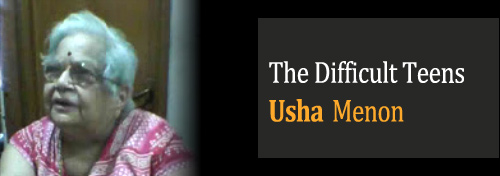The Difficult Teens
Right from childhood to adulthood, a person has to face and tackle several problems, some simple and some tough. Life itself is a challenge. After birth, the child’s needs and requirements are met by the parents. He/she looks up to the mother or father for his/her needs.
The brush with reality brings with it a plethora of dilemmas and conflicts which the child is unable to solve. The most important and the most difficult period in a child’s life is the beginning of ‘teens.’ This period is a trying time not only for the child but also for the parents.
It is at this stage that the child is neither an adult nor a child. The child is in an awkward situation. I remember Rabindra Nath Tagore’s story which deals with difficult situations a teenager has to face. I quote the evergreen lines from the story, “In this world of human affairs there is no worse nuisance than a boy at the age of fourteen. He is neither ornamental nor useful. It is impossible to shower affection on him as on a little boy; and he is always getting in the way. If he talks in a childish lisp he is called a baby, and if he answers in a grown up way he is called impertinent. In fact, any talk at all from him is resented.”
Based on my experience as a mother of two children, a grandmother of four grand children and an educationist dealing with innumerable children, I list below some important points which the parents must keep in mind while dealing with teenagers. (There are no hard and fast rules to succeed in this endeavour. These are only broad outlines.)
- Respect the dignity of your child. Never talk about his shortcomings in front of outsiders.
- You know your child best. You should be able to grasp the significance of his body language. The child may be shy to express his/her doubts; as a parent you should be able to judge that something is troubling him/her. This is a crucial period in the life of a child. The changes taking place in his/her body baffles the child. It is for the parent to instill confidence in the child.
- These days the media and the Press highlight issues of sex, rape, child abuse, etc. The parent must not be shy of discussing matters relating to these problems. Talk frankly and judiciously to the child. In case of child abuse the parent must caution the child.
- Parents should never quarrel/argue in front of the growing children. This is the stage when such situations leave a permanent imprint on the child’s mind. They start weaving stories and become temperamental. Some times it may result in hatred for the parents. I remember, there was a girl who was very intelligent when she was in her primary classes. As she entered teens, her performance in studies deteriorated significantly. The class teacher took her into confidence and tried to find out the reason for the sudden change. The girl started weeping and stated that her mother was a widow. The family had no source of income and that she worked as a maid in a house after school hours. All the staff members felt sorry for her. Her Mother was summoned to the school. We were stunned to see her mother. She came in a chauffeur driven car, well dressed and a mangal sutra in her neck. When she was informed about the ‘facts’ narrated by her daughter she became annoyed and in front of all the staff, started slapping the child and abusing her in choicest Punjabi terms. It transpired that the parents argued in front of the children. The child started day dreaming and made up several stories!!
- We should never compare children’s school results. Each child has his own personality.
- In case of siblings, the elder one is generally blamed, when they fight. Words such as ‘you are the elder one’ or ‘Don’t trouble your younger brother/sister,’ leaves the elder child broken-hearted.
- Some parents brag about their ‘achievements’ in front of the children. “Wah, I fooled the other chap and got good profit”. Such utterances will adversely affect the child in his later life.
- Last but not the least gain your child’s confidence and trust. In case of any problem or difficulty the child must have faith that you are there for him/her.
Usha Menon, a 77-years-old retired educationist, who has four sweet, adorable grandchildren. Last year she wrote a book,”Reverse Gear.” This book is a sort of analogy between her professional and personal life, depicting the travails, ups and downs faced by an average working woman. As a retired person, She is leading a contented life with a loving husband, devoted son, daughter-in-law and two grand daughters. Her doting daughter, son-in-law, and two grand sons, who are very affectionate, look after her and her husband. She is grateful to God that He has, in His grace, given her an opportunity to live a life of peaceful contentment.

